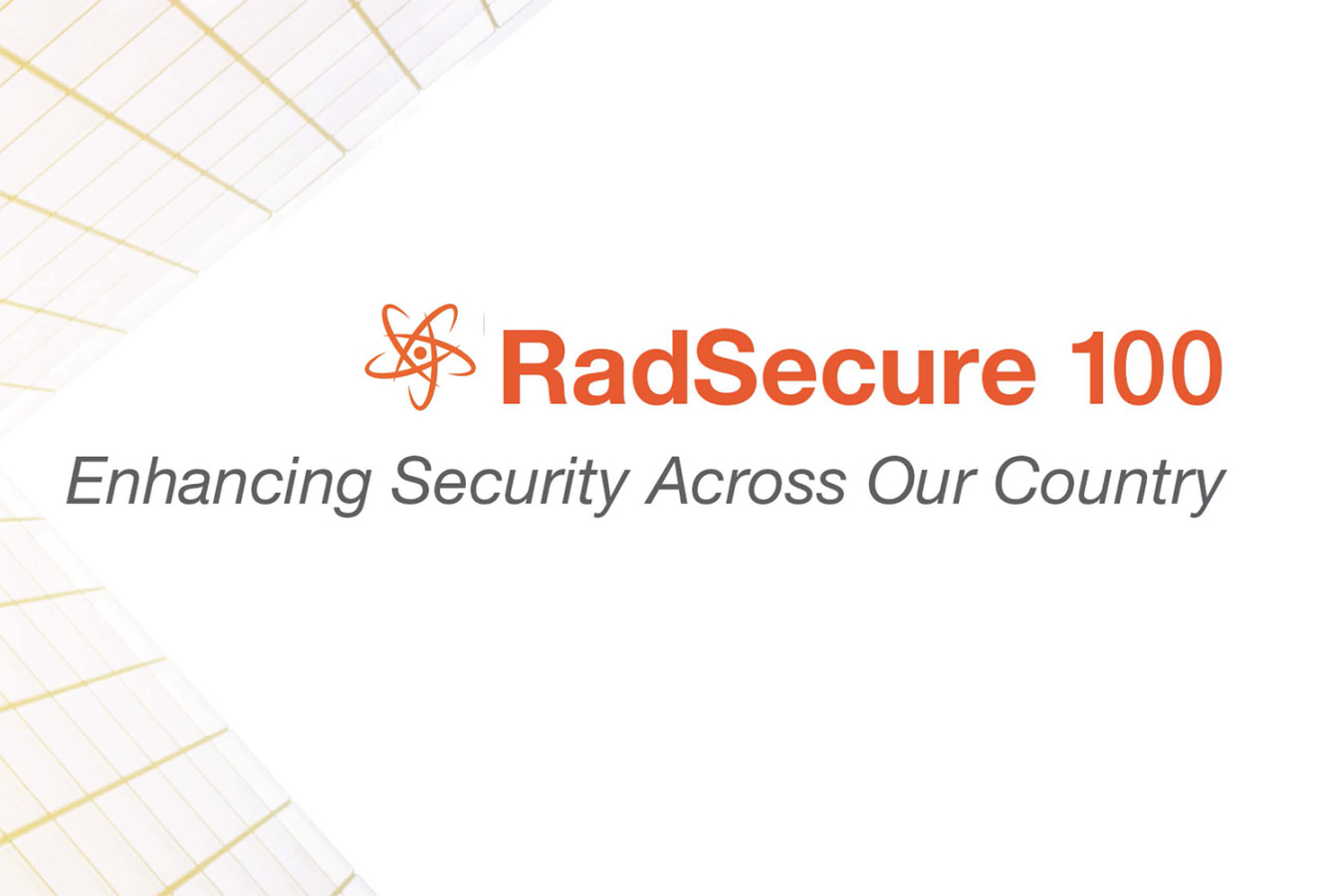NNSA launched a major project to enhance U.S. radiological security. The RadSecure 100 Initiative focuses on removing radioactive material from facilities where feasible and improving security at the remaining facilities located in 100 metropolitan areas.
National Nuclear Security Administration
August 30, 2021
Partnerships with local medical facilities, industrial firms, and law enforcement will be key to the project
The Department of Energy’s National Nuclear Security Administration (DOE/NNSA) launched a major radiological security project to enhance U.S. radiological security. The RadSecure 100 Initiative focuses on removing radioactive material from facilities where feasible and improving security at the remaining facilities located in 100 metropolitan areas throughout the United States. It includes a significant partnership with local law enforcement.
“Radioactive materials are used to treat cancer, ensure building safety, and more,” said Kristin Hirsch, Director of NNSA’s Office of Radiological Security (ORS). “But if they were lost or stolen, these materials could pose a significant risk. RadSecure 100 puts the spotlight on the highest priority materials, like cesium-137, in cities nationwide.”
In addition to cesium, RadSecure 100, a new domestic initiative from ORS, enhances radiological security in facilities that use cobalt-60, americium-241, and iridium-192, located in 100 metropolitan areas throughout the United States. The 100 metropolitan areas are listed below.
The initiative is being announced at the National Homeland Security Conference in Las Vegas.
To secure radioactive materials and reduce the risk they pose, the RadSecure 100 Initiative is using three strategies:
- Replacing radiological devices with alternative technologies not requiring a radioactive source and then removing any sources no longer needed.
- Advancing the security of radiological facilities and mobile sources by providing security enhancements.
- Integrating local law enforcement into planning and training to respond to a potential radiological theft.
“Partnerships are key to the success of RadSecure 100,” Hirsch said. “We work with medical facilities, universities, and other businesses across the country to remove and secure materials that could pose a threat. But we also work with local law enforcement to ensure a safe response should something happen.”
Removing the threat
The program partners with local governments, businesses, educational institutions, and non-profit partners to voluntarily remove the highest-risk radioactive materials. Two large pieces of that strategy include the:
- Cesium Irradiator Replacement Project (CIRP), which provides incentives to businesses to replace cesium-137 irradiators with non-radioisotopic technologies such as X-ray devices. These technologies have proven to function as well as, or better than, most existing cesium-137 irradiators.
- Off-Site Source Recovery Program, which removes, transports, and safely disposes of the cesium sources that are replaced through CIRP. It also provides these services for other eligible high-activity radioactive sources.
Securing what’s there
Where permanent risk reduction is not possible, ORS works with security personnel and first responders to develop a “containment” strategy to prevent the theft of radioactive materials from a facility. ORS assesses security, supports security enhancements, and trains personnel to address threats. The program has supported about 1,000 facilities across the United States in this way.
RadSecure 100 also focuses on transportation security so that high-risk radioactive sources - while in transport or being used in the field. ORS works with industry, shippers, and other organizations to find security solutions provide security training, and conduct analyses to better understand risk.
Working with law enforcement
Facilities with radioactive materials depend on local law enforcement to respond in a timely manner should someone try to steal radioactive material. Through RadSecure 100, ORS collaborates with agencies in 100 U.S. cities to enhance response capabilities to facilities with high-risk radioactive material.
Support for responders includes training in alarm response and using personal radiation detectors at an NNSA facility. Virtual training options have also been developed during the Covid-19 pandemic. A local option, Radiological Security Awareness Response Training, puts ORS on the road to partner cities so agencies can implement their own tailored training programs augmented by mock irradiators, trailers, and training videos as needed. Agencies that implement ORS’s Remote Monitoring System get immediate notification of a theft as well as situational awareness.
Learn more about RadSecure 100.
NNSA will be implementing RadSecure 100 in the following metropolitan areas:
Alabama
- Birmingham
Arkansas
- Little Rock
Arizona
- Phoenix
- Tucson
California
- Anaheim/Santa Ana
- Bakersfield
- Los Angeles/Long Beach
- Merced
- Oxnard
- Riverside
- Sacramento
- San Diego
- San Francisco/Bay Area
Colorado
- Colorado Springs
- Denver
Connecticut
- Hartford
- New Haven
District of Columbia
- National Capital Region
Florida
- Deltona/Daytona Beach
- Gainesville
- Jacksonville
- Miami/Ft. Lauderdale
- Orlando
- Palm Bay-Melbourne
- Tampa
Georgia
- Atlanta
- Augusta
- Buford
Hawaii
- Honolulu
Iowa
- Des Moines
Illinois
- Chicago
- Rockford
Indiana
- Indianapolis
- Evansville
- South Bend
Kentucky
- Louisville
Louisiana
- Baton Rouge
- New Orleans
- Vinton
Massachusetts
- Boston
- Worcester
Maryland
- Baltimore
Michigan
- Detroit
Minnesota
- Minneapolis/St. Paul
Missouri
- Kansas City
- St. Louis
Mississippi
- Jackson
Montana
- Billings
North Carolina
- Charlotte
- Durham/Chapel Hill
- Raleigh
- Winston-Salem
North Dakota
- Fargo
Nebraska
- Omaha
Nevada
- Las Vegas
New Jersey
- Jersey City/Newark
New Mexico
- Albuquerque
New York
- Albany
- Buffalo
- New York
- Poughkeepsie/Newburgh/Middletown
- Rochester
- Syracuse
Ohio
- Akron
- Cincinnati
- Cleveland
- Columbus
- Dayton
- Dublin
Oklahoma
- Oklahoma City
- Tulsa
Oregon
- Portland
Pennsylvania
- Allentown
- Harrisburg/Carlisle
- Philadelphia
- Pittsburgh
- Wilkes-Barre/Ashley
Puerto Rico
- San Juan
Rhode Island
- Providence
South Carolina
- Charleston
- Columbia
- Greenville
- Spartanburg
South Dakota
- Sioux Falls
Tennessee
- Knoxville
- Memphis
- Nashville
Texas
- Austin
- Dallas/Fort Worth/Arlington
- El Paso
- Houston
- McAllen
- San Antonio
Utah
- Salt Lake City
Virginia
- Norfolk
- Richmond
Washington
- Seattle
- Spokane
Wisconsin
- Madison
- Milwaukee

